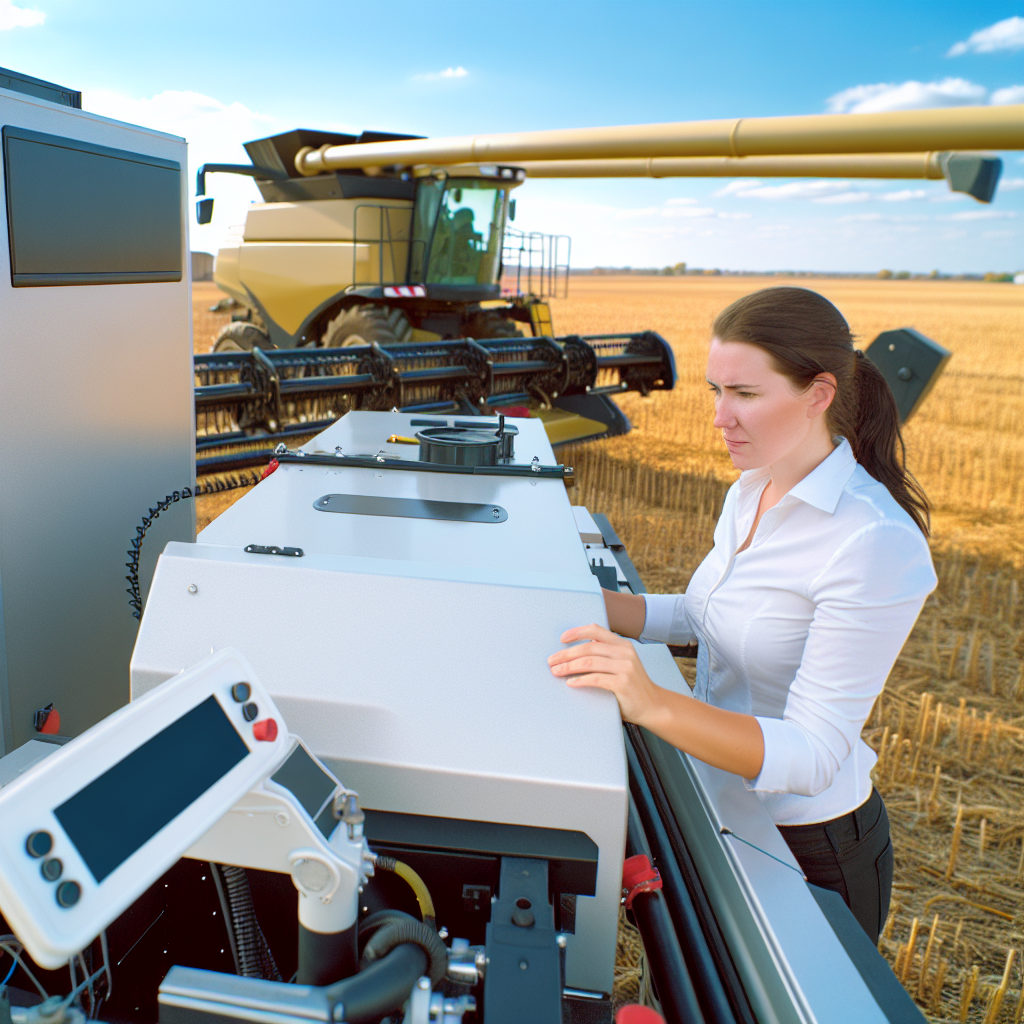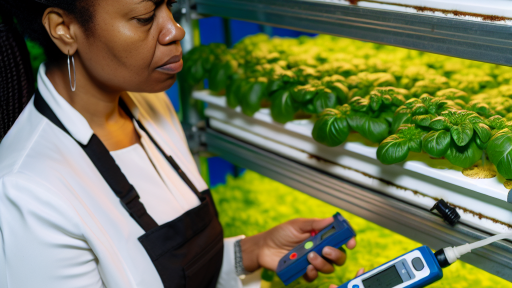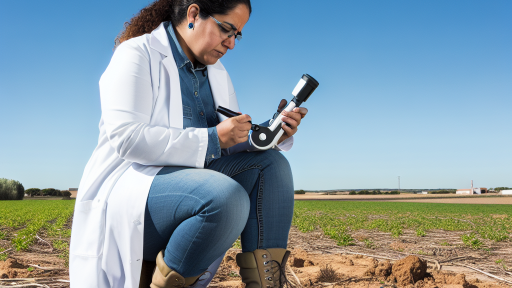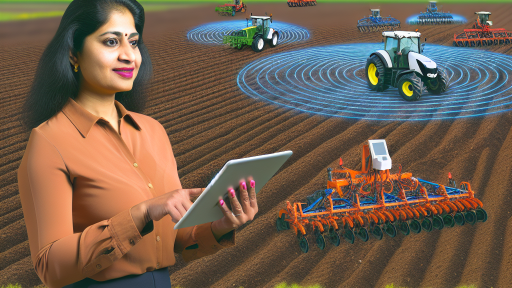Introduction to Automated Machinery in Agriculture
Automated machinery has revolutionized the agricultural sector.
This technology enhances efficiency and productivity on farms.
Farmers now rely on machines for various tasks.
Automation minimizes labor costs significantly.
Additionally, it reduces the time required for harvests.
Many farmers adopt autonomous tractors and drones.
Benefits of Automation
Automation offers numerous benefits to modern agriculture.
First, it increases overall efficiency in operations.
Next, automated systems often yield higher crop outputs.
Moreover, automation helps in precision farming techniques.
This approach improves resource management and sustainability.
For instance, automated irrigation systems control water use effectively.
As a result, farmers conserve water while maximizing crop health.
Types of Automated Machinery
Several types of automated machinery are now common on farms.
Self-driving tractors are a prime example.
Transform Your Agribusiness
Unlock your farm's potential with expert advice tailored to your needs. Get actionable steps that drive real results.
Get StartedThese machines navigate fields using GPS and sensors.
Drones also play a vital role in agricultural operations.
They assist in crop monitoring and mapping vast areas.
Additionally, robotic harvesters efficiently collect produce.
Adoption Challenges
Despite the advantages, adopting automated machinery can be challenging.
Initial costs for the technology can be substantial.
Farmers may also require training to operate new equipment.
Another challenge involves maintenance and repairs.
Technicians with specialized knowledge may be necessary.
Even so, the long-term benefits often outweigh these hurdles.
Benefits of Automation in Farm Logistics and Supply Management
Increased Efficiency and Productivity
Automation significantly streamlines farming operations.
It allows for faster processing and handling of crops.
Furthermore, automated systems reduce manual labor requirements.
As a result, farms operate more efficiently and productively.
Cost Reduction
Automation helps in lowering operational costs.
It minimizes labor costs by reducing the need for workers.
Additionally, less human error leads to fewer costly mistakes.
Automated machinery often performs repetitive tasks reliably.
Improved Accuracy and Quality Control
Automated systems enhance accuracy in logistics.
They monitor the quality of products throughout the process.
Thus, farms can ensure that only top-quality goods reach consumers.
Moreover, precise tracking reduces spoilage rates significantly.
Enhanced Data Collection and Analysis
Automation facilitates better data collection on crop yields.
This data allows farmers to make informed decisions.
Showcase Your Farming Business
Publish your professional farming services profile on our blog for a one-time fee of $200 and reach a dedicated audience of farmers and agribusiness owners.
Publish Your ProfileAdditionally, real-time monitoring improves overall farm management.
Furthermore, analytical tools provide insights into optimizing logistics.
Scalability and Flexibility
Automated systems allow farms to scale operations easily.
Farms can adapt to changing market demands quickly.
This flexibility helps in managing varying crop production cycles.
Ultimately, it supports growth in competitive markets.
Environmental Benefits
Automation contributes to sustainable farming practices.
It can optimize resource usage, reducing waste.
Efficient logistics minimize fuel consumption during transportation.
Moreover, automation can integrate renewable energy sources effectively.
Types of Automated Machinery Used in Farms
Autonomous Tractors
Autonomous tractors represent a significant advancement in farm machinery.
They operate without direct human control.
Farmers program them to perform specific tasks.
Additionally, they reduce labor costs and increase efficiency.
Many models now include GPS for precise navigation.
Robotic Harvesters
Robotic harvesters streamline the harvesting process.
These machines swiftly pick fruits and vegetables.
They minimize damage to crops during collection.
Plus, they work tirelessly, even during off-peak hours.
Farmers benefit from faster harvest times and reduced labor.
Drones for Crop Monitoring
Drones enhance crop monitoring and analysis.
They provide real-time aerial views of fields.
Farmers can quickly identify areas needing attention.
Moreover, drones help with assessing plant health and growth.
This technology leads to informed decision-making and efficient resource use.
Automated Vehicles for Supply Transport
Automated vehicles handle the transport of supplies on farms.
These vehicles move goods efficiently between locations.
They navigate through fields and warehouses with ease.
Thus, farmers save time and labor resources on logistics.
Precision Agriculture Tools
Precision agriculture tools optimize farming practices.
They involve the use of sensors and data analytics.
These tools help in monitoring soil conditions and crop performance.
Additionally, they assist in managing water usage efficiently.
Farmers can tailor their practices for enhanced yields.
Delve into the Subject: Automated Machinery for Efficient Irrigation Systems
Case Studies: Successful Implementation of Automation in Agriculture
Introduction to Automation in Farming
Automation transforms modern agriculture dramatically.
It streamlines farm logistics and enhances supply efficiency.
Case studies highlight the successful application of automation.
Harvest Automation at Green Valley Farms
Green Valley Farms implemented automated harvesting machinery.
This advanced technology increased yield efficiency significantly.
Showcase Your Farming Business
Publish your professional farming services profile on our blog for a one-time fee of $200 and reach a dedicated audience of farmers and agribusiness owners.
Publish Your ProfileFarmers reported reduced labor costs as a result.
The machinery also improved collection speed during peak seasons.
Precision Irrigation System at Riverbank Agriculture
Riverbank Agriculture adopted precision irrigation technology.
The system utilizes soil moisture sensors for optimal watering.
Farmers noted a substantial decrease in water waste.
Moreover, crop yields improved due to better moisture control.
Transport Automation at Fresh Produce Distributors
Fresh Produce Distributors embraced automated transport solutions.
This initiative optimized the movement of goods to market.
Delivery times improved significantly with real-time tracking.
The automation reduced human errors in loading and routing.
Results and Key Takeaways
These case studies demonstrate the effectiveness of automation.
Increased efficiency and cost reductions are notable benefits.
Furthermore, automation contributes to sustainable farming practices.
Adopting technology can lead to significant competitive advantages.
Uncover the Details: Automated Machinery for Pest Control Strategies
Challenges and Limitations of Automated Farm Machinery
High Initial Costs
Implementing automated machinery involves significant upfront investment.
Farmers often face financing hurdles to cover these costs.
Additionally, advanced technology may require specialized skills.
Technical Limitations
Automated systems often encounter challenges in diverse conditions.
Weather variability can impede machinery performance.
Moreover, terrain changes may complicate operations.
Maintenance and Downtime
Automated farm machinery requires regular maintenance to function optimally.
Prolonged downtime can disrupt farming schedules significantly.
Farmers must budget for both repairs and preventive upkeep.
Dependence on Technology
Operators increasingly depend on technology for essential tasks.
This reliance can lead to skills degradation over time.
Consequently, a lack of technical know-how can be detrimental.
Data and Cybersecurity Concerns
Automated systems generate vast amounts of data.
Data security breaches pose significant threats to farm operations.
Farmers must implement effective cybersecurity measures continuously.
Regulatory Challenges
The agricultural sector faces evolving regulations affecting automation.
Compliance with new laws can be complex and costly.
Farmers need to stay informed about legal obligations regularly.
You Might Also Like: Integrating Robotics Into Traditional Farming

Future Trends in Agricultural Automation and Technology
Growth of Robotics in Agriculture
Robotic technology is transforming the agricultural landscape.
Robots now assist with planting, harvesting, and packaging tasks.
This automation reduces reliance on manual labor and enhances efficiency.
Consequently, farms are increasing their output and minimizing costs.
Moreover, companies are developing specialized robots for diverse crops.
Today, robotic solutions like drones help with monitoring and mapping fields.
Showcase Your Farming Business
Publish your professional farming services profile on our blog for a one-time fee of $200 and reach a dedicated audience of farmers and agribusiness owners.
Publish Your ProfileIntegration of AI and Big Data
Artificial Intelligence (AI) plays a crucial role in modern agriculture.
Farmers leverage AI to analyze vast amounts of data efficiently.
For instance, up-to-date forecasts guide irrigation and planting schedules.
This data-driven approach leads to improved crop yields and resource use.
Additionally, predictive analytics helps identify pest and disease outbreaks.
Advances in Precision Agriculture
Precision agriculture is enhancing farming techniques significantly.
This method relies on technology to monitor field variability.
Farmers can optimize field-level management regarding crops.
As a result, they apply fertilizers and pesticides more effectively.
The environmental impact of farming reduces due to these practices.
Emergence of Autonomous Vehicles
Autonomous vehicles are making their way into farms worldwide.
These driverless vehicles facilitate various agricultural tasks.
For example, they transport goods and perform field operations automatically.
Farmers can reduce operational costs and maximize uptime with these systems.
Additionally, machinery connectivity enhances farm management efficiency.
Role of Sustainable Farming Techniques
Sustainability trends are increasingly influencing agricultural technology.
Farmers focus on eco-friendly practices alongside automation.
Technologies such as solar-powered machinery are gaining traction.
This shift promotes a lower carbon footprint in agricultural processes.
Furthermore, sustainable practices ensure food production meets future demands.
Collaboration Among Agri-Tech Companies
Partnerships among agri-tech companies are fueling innovation.
These collaborations lead to the development of smarter farming tools.
Companies like AgroTech Solutions and FarmBot Innovations are leading the way.
Their efforts produce integrated solutions for optimal farm management.
Such alliances also enhance sharing of best practices across the industry.
Learn More: Efficient Irrigation Solutions by Agri Services International in Lake Wales
How Automated Machinery Enhances Supply Chain Efficiency in Farming
Streamlined Operations
Automated machinery simplifies tasks within the farming supply chain.
Farmers can manage planting, irrigation, and harvesting effectively.
Additionally, machines reduce manual labor requirements significantly.
This leads to increased productivity and lower costs for farmers.
Real-Time Data Utilization
Automated systems collect data throughout farming operations.
This data helps farmers make informed decisions quickly.
For instance, drones monitor crop health and soil conditions continuously.
Thus, farmers can optimize resource allocation accordingly.
Enhanced Logistics Management
Automated logistics systems streamline the movement of goods.
They ensure timely deliveries from farm to market.
This reliability builds stronger relationships with suppliers and customers.
Moreover, it minimizes delays that can jeopardize food freshness.
Reduced Waste and Loss
Automation helps identify inefficiencies and areas of waste.
Farmers can track inventory levels accurately and in real-time.
Showcase Your Farming Business
Publish your professional farming services profile on our blog for a one-time fee of $200 and reach a dedicated audience of farmers and agribusiness owners.
Publish Your ProfileThis reduces instances of overstocking or spoilage.
Consequently, farmers can maximize profits and sustainability.
Improved Labor Management
With reduced need for manual labor, farmers can allocate resources wisely.
Automated machinery enables workers to focus on higher-level tasks.
Thus, it enhances job satisfaction and safety for employees.
Furthermore, it mitigates labor shortages in the agricultural sector.
Environmental Impact and Sustainability of Automated Agricultural Practices
Reductions in Chemical Use
Automated machinery reduces the need for chemical applications on farms.
This minimization of chemicals promotes healthier ecosystems.
Furthermore, it decreases the potential for harmful runoff into waterways.
Improved Soil Health
Automation often involves precision agriculture techniques.
These techniques enhance nutrient management tailored for specific crop needs.
Consequently, soil degradation is mitigated through more thoughtful practices.
Water Conservation Strategies
Automated systems efficiently manage water usage on farms.
They utilize sensors and data analytics for optimal irrigation practices.
This approach reduces water wastage significantly.
Carbon Footprint Reduction
By utilizing electric and hybrid machinery, farms lower their carbon emissions.
Automation improves efficiency, leading to reduced fuel consumption.
Thus, farms can operate more sustainably over time.
Enhancing Biodiversity
Automated practices often allow for increased crop diversity.
This diversity supports various species and strengthens ecosystems.
Moreover, it helps in pest management by introducing natural competitors.
Challenges to Sustainability
While automation has numerous benefits, challenges remain.
Initial costs of technology can deter small farmers.
Additionally, reliance on technology may lead to decreased traditional practices.
Future Directions in Sustainable Practices
Advancements in automated technology promise further improvements.
Continuous innovation can enhance sustainability in farming.
Overall, automated machinery has the potential to transform agriculture positively.




